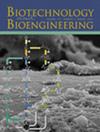Systems Metabolic Engineering of Clostridium tyrobutyricum for 1,3‐Propanediol Production From Crude Glycerol
IF 3.5
2区 生物学
Q2 BIOTECHNOLOGY & APPLIED MICROBIOLOGY
引用次数: 0
Abstract
酪氨酸丁酸梭菌从粗甘油生产1,3 -丙二醇的系统代谢工程
酪酸丁酸梭菌已经成为一种非致病微生物细胞工厂,能够厌氧生产各种增值产品,如丁酸盐、丁醇和丁酸丁酯。本研究报道了C. tyrobutyricum从工业副产物粗甘油中异源生产1,3‐丙二醇(1,3‐PDO)的第一个系统工程。首先,构建了1,3 - PDO生成的甘油还原途径,并阐明了C. tyrobutyricum独特的甘油氧化途径。随后,甘油代谢和1,3‐PDO合成途径被增强。此外,优化了胞内还原电源和发酵工艺,以提高1,3‐PDO的产量。结果表明,使用粗甘油和鱼粉可得到54.06 g/L 1,3‐PDO,产率为0.64 mol/mol,产率为1.13 g/L·h。本文所述的策略可以促进C. tyrobutyricum作为合成有价值化学品的健壮宿主的工程。
本文章由计算机程序翻译,如有差异,请以英文原文为准。
求助全文
约1分钟内获得全文
求助全文
来源期刊

Biotechnology and Bioengineering
工程技术-生物工程与应用微生物
CiteScore
7.90
自引率
5.30%
发文量
280
审稿时长
2.1 months
期刊介绍:
Biotechnology & Bioengineering publishes Perspectives, Articles, Reviews, Mini-Reviews, and Communications to the Editor that embrace all aspects of biotechnology. These include:
-Enzyme systems and their applications, including enzyme reactors, purification, and applied aspects of protein engineering
-Animal-cell biotechnology, including media development
-Applied aspects of cellular physiology, metabolism, and energetics
-Biocatalysis and applied enzymology, including enzyme reactors, protein engineering, and nanobiotechnology
-Biothermodynamics
-Biofuels, including biomass and renewable resource engineering
-Biomaterials, including delivery systems and materials for tissue engineering
-Bioprocess engineering, including kinetics and modeling of biological systems, transport phenomena in bioreactors, bioreactor design, monitoring, and control
-Biosensors and instrumentation
-Computational and systems biology, including bioinformatics and genomic/proteomic studies
-Environmental biotechnology, including biofilms, algal systems, and bioremediation
-Metabolic and cellular engineering
-Plant-cell biotechnology
-Spectroscopic and other analytical techniques for biotechnological applications
-Synthetic biology
-Tissue engineering, stem-cell bioengineering, regenerative medicine, gene therapy and delivery systems
The editors will consider papers for publication based on novelty, their immediate or future impact on biotechnological processes, and their contribution to the advancement of biochemical engineering science. Submission of papers dealing with routine aspects of bioprocessing, description of established equipment, and routine applications of established methodologies (e.g., control strategies, modeling, experimental methods) is discouraged. Theoretical papers will be judged based on the novelty of the approach and their potential impact, or on their novel capability to predict and elucidate experimental observations.
 求助内容:
求助内容: 应助结果提醒方式:
应助结果提醒方式:


